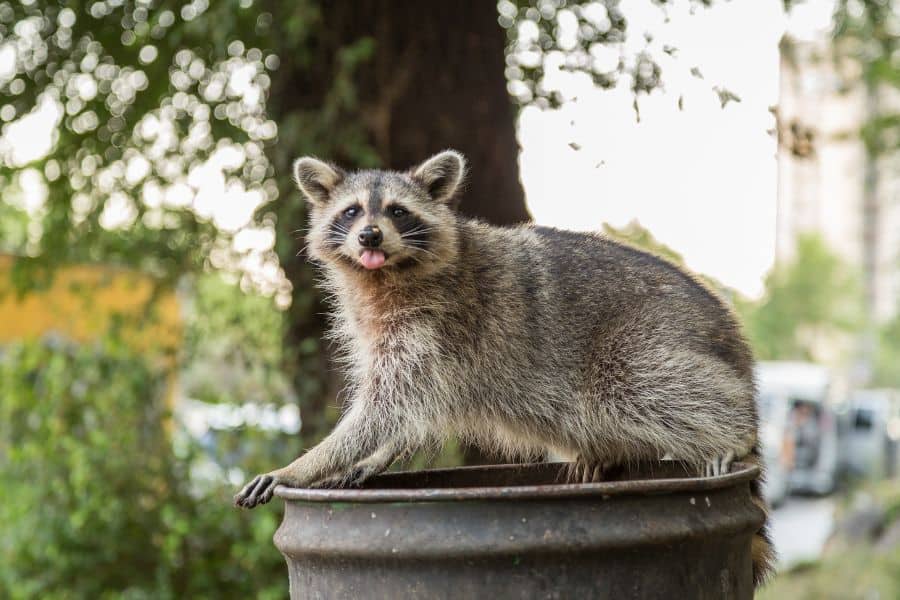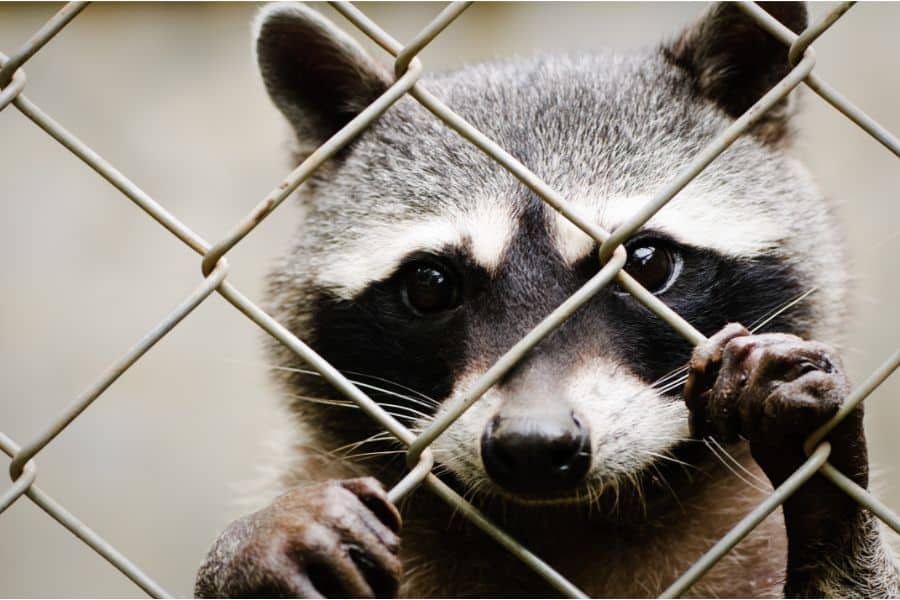Raccoons, also called trash pandas, often find their way into our garbage containers at night to scavenge on discarded food.
But do raccoons eat chickens?
Well, that’s what this blog post is all about. Herein, we’ve gathered all the information you need about this dexterous mammal, including whether or not it is a source of threat for your feathered friends. Keep reading for more!
Do Racoons View Chickens As Prey?
Yes, raccoons view chickens as prey and will, without remorse, make the most out of the slightest opportunity to devour your feathered friends. If you suspect that the pesky creature is invading your home at night, take the necessary measures to ensure the safety of your flock.
As omnivorous, raccoons will eat almost anything they come across – from fruits and vegetables to fish, frogs, seeds, and of course, your adorable feathered friends!
Hence, if you’re a chicken parent living in an area with a large raccoon population or suspect that you could be sharing your home with these creatures, you should be worried about the safety of your backyard flock.
Check this video to see how raccoon kills chicken:
How To Know That There Are Racoons In Your Area
Before you focus on keeping these predators off your birds, seek clarity of what you’re dealing with. Raccoons can be hard to spot, especially during the day, making it difficult to tell whether your flock is at risk of attack from these predators.
But it doesn’t have to be a puzzling affair!
Using the tell-tale signs we’re about to share with you, you can quickly know whether or not there are raccoons in your area.
Here are some indicators:
Raccoon Sounds
Raccoons are very vocal creatures that can make over 200 sounds, although they use some sounds more often than others.
One way to tell that you have raccoons near your home is through these sounds. The type of noise they make depends on the raccoon’s age and nature of the message they’re trying to convey.
Chittering, whimpering, snarling, growling, hissing, or screeching sounds should alert you of adult raccoons nearby. Baby raccoons, on the other hand, will produce mewing, crying, and whining noises when communicating.
You Observed Them
If you sighted a raccoon inside your home or nearby, you don’t need any other proof that the creatures are in your vicinity.
In the wild, raccoons live in hollow trees, ground burrows, and rock crevices. But during late summer and fall, these creatures begin to journey into our homes to seek refuge during the colder months.
If you spot a raccoon in your home or nearby during this period, chances are they’ve already taken up residence in your space. Attics, chimneys, barns, and hollow areas beneath porches and sheds are their favorite hiding spots.
Raccoon Tracks
If you can’t see raccoons or hear any of their noises, you’re not out of the woods yet! Check for any tracks inside your home.
Raccoon toes look much similar to those of dogs and cats, and it can be difficult for an untrained eye to tell the difference. But by examining a few distinctive factors, you can quickly know whether the traces belong to raccoons or your household pets.
For one, unlike most dogs and cats with five toes on their front paws and four on their rear paws, raccoons have five toes on all four paws. The front tracks usually measure about 2-1/4 inches long, while those of the rear legs are slightly longer at about 3-1/4 inches.
In addition, raccoons use their entire paws when walking, so their traces will look like a human hand but with a claw at the end. The tracks are also usually paired, meaning that the front and hind tracks will be positioned close to each other when the critter is walking along.
Raccoon Scats
The other way to tell if you have raccoons around is by checking for their droppings. Usually, raccoon droppings are dark and tubular with a pungent odor. The feces are typically 1/4 to an inch in diameter, with the length varying between 1 to 3 inches.
But as you check the droppings, one thing worth noting is that raccoon feces often contain Baylisascaris procyonis, a dangerous roundworm that can be passed to humans. So, be careful when handling raccoon feces to avoid infection.
3 Signs You’re Dealing With a Racoon Attack
Raccoons are intelligent nocturnal creatures that usually stay out of sight all day and show up at the wee hours of the night when your chickens are most vulnerable. In case of an attack on your flock, check out these clues to know if you’re dealing with a raccoon problem.
Total Mess Everywhere
Raccoons aren’t the kind of predators that will carry prey to their dens. They just don’t have that patience. Instead, they’ll devour their catch on the spot and leave a strong message at the scene.
Scattered feathers, blood stains on the floor, and chicken parts inside and outside the chicken house indicate that the culprit is more likely to be raccoon than any other chicken predator.
Partially Eaten Chickens
While raccoons can eat any part of the chicken, they often target the head, breast, and comb. Once they pull these parts off, especially the breast meat, they’re more likely to go for their next target than proceed with other parts.
Where the raccoon can’t find their way into the poultry house, it will opt to pull any part of the bird through the holes of the fence, and more often, that will be the head. It’ll then move on to the next chicken, and so on, until it has had its fill.
Claw Marks on The Coop
The other sign you can rely on to tell that you’re dealing with raccoons is to check for their claw marks. These mammals are more likely to scratch or make claw marks on the coop as they try to find their way in.
9 Ways to Keep Your Chickens Safe from Raccoons
If everything shows that raccoons are attacking your flock, the next thing you need to do as a responsible chicken keeper is come up with ways to curb the killings. Here are some clever strategies you can implement.
1. Say NO to Feeding Raccoons
Don’t be fooled by the cute looks – raccoons aren’t pets. In fact, these creatures are a vector species, meaning they’re more likely than other species to carry and transmit rabies, which is a dangerous virus that can cause brain disease and sometimes even death, especially when not treated on time.
Therefore, if you have the habit of feeding raccoons, refrain. It’s not only safe for your health but also good for the safety of your flock.
Abstaining from feeding raccoons will make your home less attractive to them and may help keep them away, which is indeed a big step in safeguarding your feathered friends.
2. Secure Garbage Bins & Compost Piles
Even without feeding them, raccoons are natural scavengers that can sniff their way into your garbage bins and compost piles. That’s why you should always secure your garbage bins and compost piles to keep them from accessing any food in your home.
One essential thing to remember is that these mammals are highly dexterous and can easily remove unsecured garbage lids. Use tight-fitting lids for your garbage containers or secure the lids using other means, like bungee cords.
As for compost piles, switch to pest-proof containers if you’re using a different kind. It will keep raccoons, rats, opossums, skunks, and other critters likely to get attracted to it at bay.
If possible, avoid putting in your compost dairy products, fish, fat, bones, fish, and other foods likely to stink it up and attract raccoons and other pests.
3. Collect Your Eggs Regularly
Sometimes raccoons will come into your home in search of unprotected eggs and not necessarily chickens, especially if you’ve been leaving out eggs to stay in the nest for long periods.
As such, to keep these pesky creatures away, regularly collect eggs from nests and keep them from raccoon access. You can do the collection at least twice a day, preferably scheduling one at dusk so that you don’t have any eggs left overnight.
4. Keep Your Flock Indoors at Night
It might look like a silly mistake, but forgetting to lock your chickens into their coop at night has happened to the best of us. Unfortunately, it can turn into a costly mistake by simplifying hunting for raccoons and other poultry predators.
As a responsible chicken keeper, always keep your flock in their coop at night. If you tend to forget, find a way to always remind yourself to lock your birds up. If it means setting a reminder on your phone, go for it.
5. Reinforce the Structural Integrity of the Coop
Size isn’t the only factor to consider when constructing a chicken coop. Ensuring that the poultry house has adequate safety features to keep your flock from predator attacks is just as important.
Raccoons are clever and know how to exploit any structural flaws in your coop. Combined with the intelligence and skill to open locks, burrow beneath obstacles, and squeeze through tiny gaps, it gets even more difficult to ward off a determined raccoon.
But with the following measures, it’s easy;
- Fix any gaps or cracks in the coop’s structure: With their sharp paws, these creatures can build on the smallest gap or crack to access the poultry house, so don’t ignore even the slightest gaps.
- Be careful with your securing mechanism: Locks and latches are easy for raccoons to open in minutes. Use padlocks with keys instead or a combination lock for guaranteed safety.
- Reinforce the top and bottom: Sometimes, raccoons will use the bottom or top of the coop to gain access. To avoid that, use wire mesh at the bottom and ensure that you fix or replace any loose shingles that could grant the predator easy access.
6. Get A Guard Dog
If you’re a chicken keeper and at the same time a dog lover, one of the best ways to ensure the safety of your chickens is by bringing on board a guard dog. A guard dog will watch over your feathered friends and keep raccoons and other predators from your space.
Of course, not every dog species is a guard dog. Choose one of the best guard dogs like the Anatolian Shepherd, Appenzeller Sennenhund, Australian Shepherd, or any other dog species that will be up to the task.
Whatever breed you choose, ensure that your furry friend receives proper training. It will equip him with raccoon-deterring instincts and skills.
Of course, you’ll also need to socialize your guard dog so he doesn’t see everyone coming into your home as a potential threat.
7. Use Motion-Activated Lights and Alarms
Raccoons generally fear humans and will do anything to avoid them. Using motion-activated lights and alarms can give them a false impression that humans are around, thus scaring them away.
This method also works well to keep deers, opossums, skunks, and several other uninvited guests away from your space.
However, before inviting in some of the best lights and alarms, note that the technique only remains effective for the first few encounters. With time, raccoons will learn that the light or alarm doesn’t mean danger and become less likely to get startled by it.
8. Strengthen your Perimeter Fence
Your perimeter fence is your first line of defense against raccoons and other chicken predators. When not installed properly, it can be easy for these predators to breach it and attack your birds.
Proper installation involves ensuring that 6 to 10 inches of the fence is buried underground with a 12-inch outward extension. This will help keep these talented diggers from burrowing under the fence into your home.
If possible, consider using two electrified wires around your perimeter fence. Install the bottom wire about 6 to 8 inches above the ground and run the second one 6 inches above it for greater effectiveness.
But as you do that, ensure that you set the voltage just high enough to scare the raccoons from your home without harming or killing them.
Also, it’s a good idea to use a timer for electrification so that the fence becomes electrified only at night when raccoons are most active. Doing this will minimize the predation and, at the same time, minimize the risk of shocking yourself, a pet, a neighbor, or a child during the day.
9. Seek Professional Help
If you’ve gotten to your wit’s end after trying the above methods, it’s time to bring in a professional expert. Expert animal removers have the skills and tools necessary to help you win your battle against raccoons.
Of course, you may need to pay a fee depending on who you bring in to help. Nonetheless, it’s one of the most effective ways if your DIY hacks don’t seem to do the trick.
Also Read:
FAQS
Do Raccoons Eat Cooked Chicken?
Yes, as omnivorous, raccoons eat a wide range of foods, including chicken – whether cooked or raw. Other foods that make a delicacy for raccoons include eggs, seafood, fruits, vegetables, and almost anything else that looks and smells like food and has some nutritional value.
Why Do Raccoons Only Eat Chicken Heads?
Raccoons usually eat a chicken head because it’s the most accessible part. A chicken head is the part they’re most likely to get hold of and pull through the fencing once they can’t access the coop. But with access to your chicken house, they can also eat chicken breasts, combs, and some innards.
Are Raccoons Aggressive with Humans?
Usually, raccoons aren’t aggressive toward humans. In fact, they will often run away whenever they see people. However, sometimes they may show aggression towards humans when cornered or protecting their young ones, but that happens with almost every other creature.
What to Do if A Raccoon Approaches You?
Raccoons are scared of humans and will hardly approach them. But in case a raccoon comes running at you, clap your hand and yell at it. That will be enough to remind it that you’re a scary predator and convince it to run off.
What Powers Do Raccoons Have?
Raccoons generally have keen senses of smell, hearing, and sight. However, their sense of smell is a bit wanting, which is probably why they won’t mind feasting on almost anything they find in your garbage container.
Conclusion
Raccoons are lethal chicken predators that you must keep away from your flock. While they usually won’t eat the whole chicken, raccoons go for the head, breast, and a few other chicken parts and target multiple chickens instead.
Hence, do everything it takes to keep them from entering your space. Of course, keeping them entirely may be difficult, but with the measures we’ve provided in this blog post, you should find it easy to win the battle against these pesky beings.


